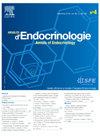二甲双胍需要瘦素运输来调节其抗肥胖作用
IF 2.9
3区 医学
Q3 ENDOCRINOLOGY & METABOLISM
引用次数: 0
摘要
肥胖是一种全球流行病,是由食物摄入和能量消耗之间的不平衡造成的。瘦素是一种脂肪因子,通过减少食物摄入和增加下丘脑的能量消耗来调节能量稳态。然而,在饮食诱导的肥胖(DIO)中,循环瘦素不能到达下丘脑中基底(MBH)的目标神经元。第三脑室内的伸长细胞是一种特殊的胶质细胞,它通过ERK和瘦素受体(LepR)依赖机制促进瘦素转运到MBH。在DIO小鼠中,ERK再激活恢复了这种转运,而伸长细胞特异性LepR敲除(LeprTanKO)则损害了这种转运。我们研究了二甲双胍(一种已知能促进体重减轻和改善瘦素敏感性的降糖药物)是否能影响DIO中瘦素的转运。慢性二甲双胍治疗通过减少DIO小鼠的食物摄入量来减轻体重。下丘脑微透析显示体重减轻与瘦素运输恢复一致。重要的是,单细胞特异性LepR缺失减弱了二甲双胍对瘦素运输和体重减轻的影响,表明其抗肥胖作用需要功能性单细胞运输。在培养的伸长细胞中,二甲双胍直接刺激内化瘦素的胞外分泌。为了探索其机制,我们研究了二甲双胍的作用是否依赖于AMPK,这是该药的一个常见靶点。tanycell特异性AMPKα1/2敲除没有阻止体重减轻,这表明AMPK不是必需的。然而,二甲双胍和瘦素联合治疗激活了ERK,表明ERK是一个关键的中介。这些发现表明,二甲双胍通过重新激活鞣皮细胞中的ERK信号,在肥胖早期恢复瘦素运输,从而阻止疾病进展。因此,二甲双胍可能是一种有价值的早期干预策略,可以减少对强效、不太为人所知的减肥药的依赖。本文章由计算机程序翻译,如有差异,请以英文原文为准。
Metformin requires tanycytic leptin transport to mediate its anti-obesity effect
Obesity is a global epidemic driven by an imbalance between food intake and energy expenditure. Leptin, an adipokine, regulates energy homeostasis by reducing food intake and increasing energy expenditure via actions in the hypothalamus. In diet-induced obesity (DIO), however, circulating leptin fails to reach target neurons in the mediobasal hypothalamus (MBH). Tanycytes—specialized glial cells lining the third ventricle—facilitate leptin transport into the MBH through ERK- and leptin receptor (LepR)-dependent mechanisms. In DIO mice, ERK reactivation restores this transport, while tanycyte-specific LepR knockout (LeprTanKO) impairs it.
We investigated whether metformin, an anti-diabetic drug known to promote weight loss and improve leptin sensitivity, can influence leptin transport in DIO. Chronic metformin treatment reduced body weight by decreasing food intake in DIO mice. Hypothalamic microdialysis showed that weight loss coincided with restored leptin transport.
Importantly, tanycyte-specific LepR deletion blunted metformin's effects on leptin transport and weight loss, indicating that its anti-obesity actions require functional tanycytic transport. In cultured tanycytes, metformin directly stimulated exocytosis of internalized leptin. To explore the mechanisms, we examined whether metformin's effects depend on AMPK, a common target of the drug. Tanycyte-specific AMPKα1/2 knockout did not block weight loss, suggesting AMPK is not required. However, combined metformin and leptin treatment activated ERK, pointing to ERK as a key mediator.
These findings suggest that metformin restores leptin transport early in obesity by reactivating ERK signaling in tanycytes, halting disease progression. Metformin may thus represent a valuable early intervention strategy to reduce dependence on stronger, less understood weight-loss drugs.
求助全文
通过发布文献求助,成功后即可免费获取论文全文。
去求助
来源期刊

Annales d'endocrinologie
医学-内分泌学与代谢
CiteScore
4.40
自引率
6.50%
发文量
311
审稿时长
50 days
期刊介绍:
The Annales d''Endocrinologie, mouthpiece of the French Society of Endocrinology (SFE), publishes reviews, articles and case reports coming from clinical, therapeutic and fundamental research in endocrinology and metabolic diseases. Every year, it carries a position paper by a work-group of French-language endocrinologists, on an endocrine pathology chosen by the Society''s Scientific Committee. The journal is also the organ of the Society''s annual Congress, publishing a summary of the symposia, presentations and posters. "Les Must de l''Endocrinologie" is a special booklet brought out for the Congress, with summary articles that are always very well received. And finally, we publish the high-level instructional courses delivered during the Henri-Pierre Klotz International Endocrinology Days. The Annales is a window on the world, keeping alert clinicians up to date on what is going on in diagnosis and treatment in all the areas of our specialty.
 求助内容:
求助内容: 应助结果提醒方式:
应助结果提醒方式:


